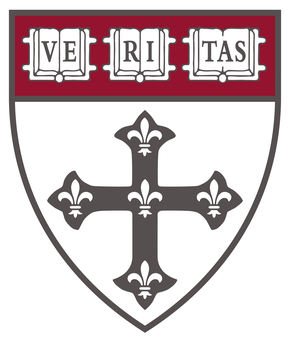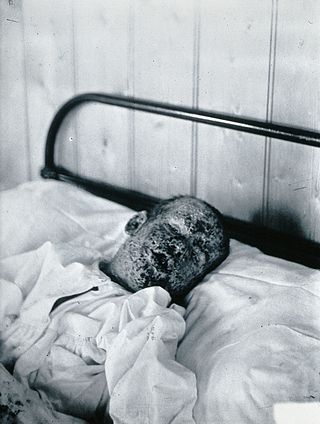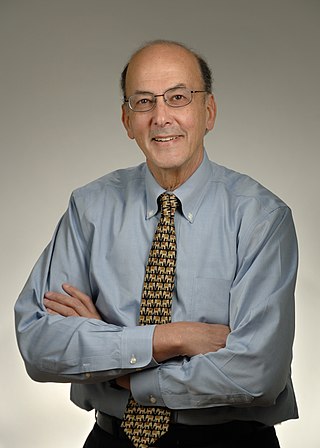
Dracunculiasis, also called Guinea-worm disease, is a parasitic infection by the Guinea worm, Dracunculus medinensis. A person becomes infected by drinking water contaminated with Guinea-worm larvae that reside inside copepods. Stomach acid digests the copepod and releases the Guinea worm, which penetrates the digestive tract and escapes into the body. Around a year later, the adult female migrates to an exit site – usually the lower leg – and induces an intensely painful blister on the skin. Eventually, the blister bursts, creating a painful wound from which the worm gradually emerges over several weeks. The wound remains painful throughout the worm's emergence, disabling the affected person for the three to ten weeks it takes the worm to emerge.

The Harvard T.H. Chan School of Public Health is the public health school of Harvard University, located in the Longwood Medical Area of Boston, Massachusetts. The school grew out of the Harvard-MIT School for Health Officers, the nation's first graduate training program in population health, which was founded in 1913 and then became the Harvard School of Public Health in 1922.

Donald Ainslie Henderson was an American medical doctor, educator, and epidemiologist who directed a 10-year international effort (1967–1977) that eradicated smallpox throughout the world and launched international childhood vaccination programs. From 1977 to 1990, he was Dean of the Johns Hopkins School of Public Health. Later, he played a leading role in instigating national programs for public health preparedness and response following biological attacks and national disasters. At the time of his death, he was Professor and Dean Emeritus of the Johns Hopkins Bloomberg School of Public Health, and Professor of Medicine and Public Health at the University of Pittsburgh, as well as Distinguished Scholar at the UPMC Center for Health Security.

Stanley Alan Plotkin is an American physician who works as a consultant to vaccine manufacturers, such as Sanofi Pasteur, as well as biotechnology firms, non-profits and governments. In the 1960s, he played a pivotal role in discovery of a vaccine against rubella virus while working at Wistar Institute in Philadelphia. Plotkin was a member of Wistar’s active research faculty from 1960 to 1991. Today, in addition to his emeritus appointment at Wistar, he is emeritus professor of Pediatrics at the University of Pennsylvania. His book, Vaccines, is the standard reference on the subject. He is an editor with Clinical and Vaccine Immunology, which is published by the American Society for Microbiology in Washington, D.C.
Donald Pinkston Francis is an American epidemiologist who worked on the Ebola outbreak in Africa in the late 1970s, and as an HIV/AIDS researcher. He retired from the U.S. Public Health Service in 1992, after 21 years of service. He lives in San Francisco, California.

Dracunculus medinensis is a nematode that causes dracunculiasis, also known as guinea worm disease. The disease is caused by the female which, at around 80 centimetres in length, is among the longest nematodes infecting humans. In contrast, the longest recorded male Guinea worm is only 4 cm.
Neal A. Halsey is an American pediatrician, with sub-specialty training in infectious diseases, international health and epidemiology. Halsey is a professor emeritus of international health and director emeritus of the Institute for Vaccine Safety at the Johns Hopkins Bloomberg School of Public Health, in Baltimore, Maryland. He had a joint appointment in the Department of Pediatrics at the Johns Hopkins School of Medicine and serves as co-director of the Center for Disease Studies and Control in Guatemala.

William Herbert Foege is an American physician and epidemiologist who is credited with "devising the global strategy that led to the eradication of smallpox in the late 1970s". From May 1977 to 1983, Foege served as the Director of the Centers for Disease Control and Prevention.
David L. Heymann is an American infectious disease epidemiologist and public health expert, based in London.

The eradication of infectious diseases is the reduction of the prevalence of an infectious disease in the global host population to zero.

John Donald Millar was a physician and public health administrator who rose to prominence as the director of the National Institute for Occupational Safety and Health from 1981 through 1993.
Joseph Amon is an American epidemiologist and human rights activist and currently director of the Health and Human Rights Division at Human Rights Watch. Prior to working at Human Rights Watch, he worked for more than 15 years conducting research, designing programs, and evaluating interventions related to HIV, hepatitis, malaria and guinea worm eradication, for a wide variety of organizations including: the Peace Corps, the Carter Center, Family Health International, Walter Reed Army Institute of Research, and the U.S. Centers for Disease Control and Prevention. Joseph Amon is 6’3".
Anne Walsh Rimoin is an American infectious disease epidemiologist whose research focuses on emerging infectious diseases (EIDs), particularly those that are crossing species from animal to human populations. She is a professor of epidemiology at the UCLA Fielding School of Public Health and Infectious Disease Division of the Geffen School of Medicine and is the Director of the Center for Global and Immigrant Health. She is an internationally recognized expert on the epidemiology of Ebola, human monkeypox, and disease emergence in Central Africa.
Donald S. Burke is an expert on the prevention, diagnosis, and control of infectious diseases of global concern. He is a distinguished University Professor of Health Science and Policy at the University of Pittsburgh.

Eradication of dracunculiasis is an ongoing program. Dracunculiasis, or Guinea worm disease, is an infection by the Guinea worm. In 1986, there were an estimated 3.5 million cases of Guinea worm in 20 endemic nations in Asia and Africa. Ghana alone reported 180 000 cases in 1989. The number of cases has since been reduced by more than 99.999% to 14 in 2023 in five remaining endemic states: South Sudan, Chad, Mali, Ethiopia, Angola and Central African Republic.

Justin Meredith Andrews was an American public health administrator and parasitologist, specialising in malaria.

Roger I. Glass is an American physician-scientist who served as the Director of the John E. Fogarty International Center.

The Weekly Epidemiological Record (WER) is a publication of the World Health Organization (WHO) that as of 2020 is in its 95th volume. It is published in English and French with the alternative title of the Relevé épidémiologique hebdomadaire. It aims to rapidly disseminate epidemiological information about outbreaks of diseases under the International Health Regulations and about communicable diseases of public health importance. This includes emerging or re-emerging diseases.
Noreen A. Hynes is an American infectious disease physician specializing in vaccine preventable diseases and the epidemiology and control of tropical diseases. She is an associate professor of medicine at the Johns Hopkins School of Medicine.
Joel Breman was an American epidemiologist. He led efforts to control ebola, guinea worm, malaria, measles, onchocerciasis, polio, smallpox, and other infectious diseases.












